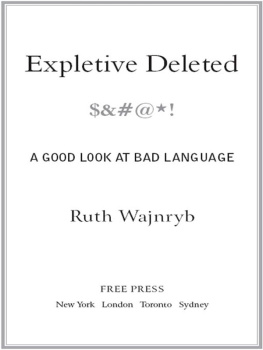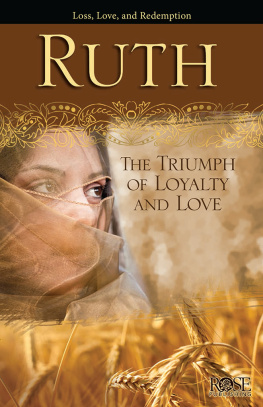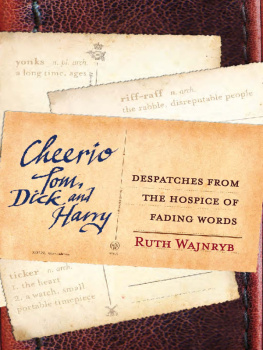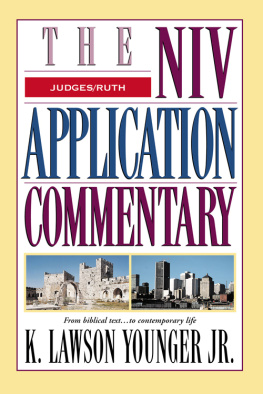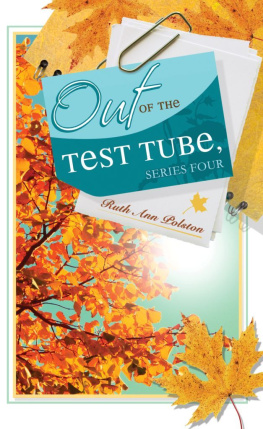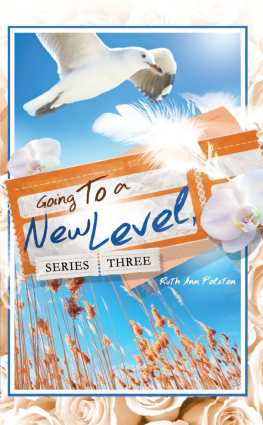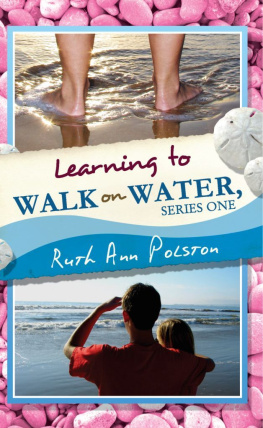Ruth Wajnryb - Expletive Deleted
Here you can read online Ruth Wajnryb - Expletive Deleted full text of the book (entire story) in english for free. Download pdf and epub, get meaning, cover and reviews about this ebook. year: 2005, publisher: Simon & Schuster, genre: Home and family. Description of the work, (preface) as well as reviews are available. Best literature library LitArk.com created for fans of good reading and offers a wide selection of genres:
Romance novel
Science fiction
Adventure
Detective
Science
History
Home and family
Prose
Art
Politics
Computer
Non-fiction
Religion
Business
Children
Humor
Choose a favorite category and find really read worthwhile books. Enjoy immersion in the world of imagination, feel the emotions of the characters or learn something new for yourself, make an fascinating discovery.
- Book:Expletive Deleted
- Author:
- Publisher:Simon & Schuster
- Genre:
- Year:2005
- Rating:3 / 5
- Favourites:Add to favourites
- Your mark:
- 60
- 1
- 2
- 3
- 4
- 5
Expletive Deleted: summary, description and annotation
We offer to read an annotation, description, summary or preface (depends on what the author of the book "Expletive Deleted" wrote himself). If you haven't found the necessary information about the book — write in the comments, we will try to find it.
Expletive Deleted — read online for free the complete book (whole text) full work
Below is the text of the book, divided by pages. System saving the place of the last page read, allows you to conveniently read the book "Expletive Deleted" online for free, without having to search again every time where you left off. Put a bookmark, and you can go to the page where you finished reading at any time.
Font size:
Interval:
Bookmark:

FREE PRESS
A Division of Simon & Schuster, Inc.
1230 Avenue of the Americas
New York, NY 10020
Copyright 2005 by Ruth Wajnryb
All rights reserved, including the right of reproduction in whole or in part in any form.
F REE P RESS and colophon are trademarks of Simon & Schuster, Inc.
Library of Congress Cataloging-in-Publication Data
Wajnryb, Ruth.
Expletive deleted: a good look at bad language / Ruth Wajnryb.
p. cm.
The characters $@*! appear after the title on the t.p.
Includes bibliographical references and index. 1. English languageObscene words. 2. Taboo, Linguistic. 3. Swearing. I. Title.
PE3724.03W35 2005
422dc22 2005043786
ISBN-13: 978-0-7432-8757-9
ISBN-10: 0-7432-8757-6
Visit us on the World Wide Web:
http://www.SimonSays.com
To Mark Cherry and Barbara Lasserre
U ntil quite recently, swearing was a subject largely ignored by those who investigate the nature of language. Well, perhaps ignored is going too far. Lets say interest was lacking. Not a lot has changed since twelve years ago, when Timothy Jay, one of the few serious researchers in this field, wrote, If all science on language stopped now, we would know very little about dirty word usage or how dirty word usage relates to more normal language use.
This lack of interest becomes glaringly obvious when you consider the massive amount of literature that has been generated analyzing discrete linguistic elements such as the past-tense inflection of -ed or present tense, third-person singular final -s. While Im happy to own up to my bias as an applied (that is, not pure) linguist, and while Im loath to cast aspersions on other linguists areas of expertise (were a small academic community, and we have to live together peaceably), I need to ask here: Is there really any competition between swearing and the bits we put on the ends of verbs as topics for study? If you didnt vote for swearing, this is where you get off. Bus stops here!
The absence of research interest in swearing is itself intriguing. In 1975 the Australian linguist B. A. Taylor published a serious study of abusive language in the Australian context. He began his paper thus:
If English werea Germanic language spoken in Northern Delaware, and particularly if it were the language of some indigenous tribe, it is pretty certain that some enterprising anthropologist would long since have recognised and described the subsystem of taboo language contained within it.
Taylor and I share a partiality to the anthropological device, for I frequently invoke the services of the Visiting Anthropologist from Mars. Taylor goes on to say that because English is the language of most of the worlds linguists, the subsystem of taboos on which swearing is based has been largely ignored or, where analyzed, undertaken in the spirit of fun, and not as a serious endeavor.
Nearly thirty years on, the situation has improveda little. Yet the fact remains that I dont need two hands to count the number of dedicated books on the subject. One explanation may be found in the sociolinguist Erving Goffmans reference to the most conventionalized and perfunctory doings we engage in[that] traditionally have been treated by students of modern society as part of the dust of social activity, empty and trivialroutine formulae-fillers.
Others have commented on the academic avoidance of this domain of language. Australian researcher Angus Kidman treats as preposterous the notion that swearing is intuitively obvious and requires no further examination. He criticizes studies that treat swearing as nothing more than a linguistic category of words and fail to see that it is a culturally driven speech act. He claims that the very fact that different word labels are used in different varieties of English (swearing in Britain and Australia; both swearing and cursing in the United States) should tell us that were not simply talking about an undifferentiated, invariant category of words.
Researcher Richard Dooling bemoans the lack of available access to the relevant literature:
The Library of Congress classification system does not provide a selection of bookson swearing or dirty words. A researchermust travel to the BF of psychoanalysis, the PE of slang, the GT of anthropology, the P of literature and literary theory, the N of art, the RC of medical psychiatry and back to the B of religion and philosophy.
Such a disorderly journey around the library shelves provides Dooling with the evidence that words such as shit are inextricably bound up with almost everything.
The fact that this area of research continues to be undervalued as an academic pursuit is itself meaningful. Im not moved by the contention that, since most linguists alive today speak English as a native language, they are therefore blind to much of their language. If this were the case, how should we explain the fascination with the morphology of the English verb system? Rather, I suspect that the taboo overlying the language of swearing has so stigmatized the subject that academics are hesitant to soil their hands even by association. They may take the view that an interest in this domain is likely to attract the raised eyebrow. At a practical level, it may not be deemed a specialization likely to win the esteem of their research fellows, a sine qua non for most academics.
How the fuck did I work that out?
P YTHAGORAS
F or generations, children have chanted Sticks and stones will break your bones / But names will never hurt you. But even if the child who was being bullied (the bullee, if you like) used this ditty as a protective strategy, no one really believed the words. Names do hurt. We do worry about what other people think and say about us. Lets face it, even that earnest class of person known as a lexicographer was, until recently, unwilling to include swear words in the dictionary for fear of offending the literate public and, through that offense, negatively impacting on publishers commercial interests. Notwithstanding its articulated mission to chart every word in the language, the Oxford English Dictionary began including so-called four-letter words only in the early 1970s. The editors of The Random House Dictionary of the English Language agonized for decades over the same issue, with their four-letter inclusions not appearing until 1987.
Those who make decisions about what goes in or stays out of newspaper text have been similarly afflicted. It is perhaps one of the remaining vestiges of the Puritan influence that Americans are even more angst-ridden about such matters than the British. In his New York Times column, William Safire once resorted to the ludicrously oblique to make his point, referring to a certain scatological noun that was on the point of hitting the fan. The taboo exerts its influence in the most curious of places, such as the following transcript of the cockpit voice recordings in a 1989 airline crash in Iowa: Were going to have to ditch this son of a [word deleted] Even in the context of disaster and imminent death, when one could argue that swearing might actually be completely appropriate, the squeamishness persists.
The fact that serious word people have been so hesitant to take the plunge perhaps carries a message for the would-be researcher. Part of the problem is that its hard to write about SHIT , FUCK , CUNT , and their fellows without using the words themselves. Although it has been done. In 1948 one Burges Johnson succeeded in writing a book on swearing, rather romantically titled The Lost Art of Profanity, without once mentioning any of the naughty words. And Jesse Sheidlower wrote a famous book called The F-Word, but such an endeavor cant have been easy.
Font size:
Interval:
Bookmark:
Similar books «Expletive Deleted»
Look at similar books to Expletive Deleted. We have selected literature similar in name and meaning in the hope of providing readers with more options to find new, interesting, not yet read works.
Discussion, reviews of the book Expletive Deleted and just readers' own opinions. Leave your comments, write what you think about the work, its meaning or the main characters. Specify what exactly you liked and what you didn't like, and why you think so.

